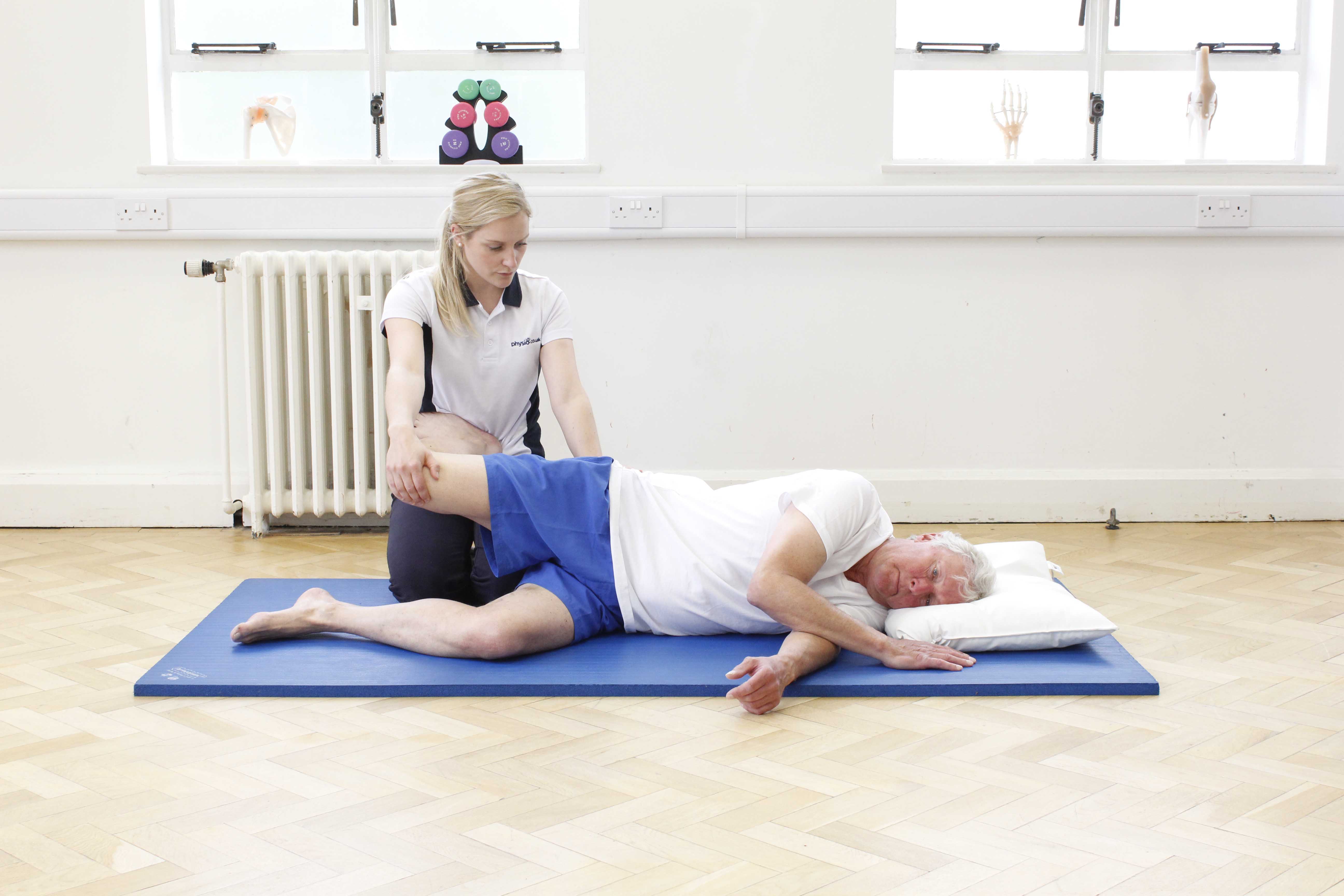What is dystonia?
Dystonia is a neurological movement disorder affecting the muscles in the body. A person with dystonia may suffer from uncontrollable muscle contractions which can lead to repetitive, often painful abnormal movements and postures. People with dystonia will have involuntary trembling in parts of the body (tremors). Dystonia can affect men and women of all ages and is a condition within itself, but also a symptom of other neurological disorders including Parkinson’s disease, stroke, traumatic brain injury, and multiple sclerosis.
 Above: Stertches and mobilisations of the hip and knee joint to relieve pain and lower muscle tone
Above: Stertches and mobilisations of the hip and knee joint to relieve pain and lower muscle toneDiagnosis of dystonia
Dystonia can be very difficult to recognise and diagnose as some doctors may be unfamiliar with the disorder.If your doctor suspects that you have dystonia they will carry out a detailed medical history and a neuromuscular examination or they will refer you to a neurologist who specialises in movement disorders. A person can be diagnosed with dystonia in childhood, adolescence or adulthood.
Types of dystonia
There are many different types of dystonia affecting different parts of the body:
- Focal Dystonia – affects one part of the body
- Multifocal Dystonia - affects several different unrelated body parts, such as eyes, hands and vocal cords
- Hemidystonia - affects one leg and one arm on the same side of the body
- Generalised Dystonia affectsmost of the body, usually the leg and trunk
- Cervical dystonia - affects the neck muscles and can make the head, twist, shake or pull in one direction uncontrollably
- Oromandibular dystonia - affects the jaw, tongue and mouth muscles and canlead to problems with eating or speaking
- Blepharospasm Dystonia - affects the muscles around the eyes and causes an abnormal twitch of the eyelid
- Writer's cramp - affects the hand and forearms and can lead to problems with writing
- Laryngeal dystonia - affects the vocal cords orspeech muscles which causes speech to become strained and weak
What causes dystonia?
The cause of dystonia is not always clear. In some cases dystonia can be hereditary which means a member of the family who may have or have had dystonia have passed it on via their genes. However, not everyone who inherits the gene develops dystonia.
Dystonia may also be caused by damage to an area of the brain called the basal ganglia. The basal ganglia controls movement by regulating muscle contractions. Damage to the basal ganglia can be due to a variety of causes such as stroke, tumour of the basal ganglia, or the result of certain drugs.
Physiotherapy for dystonia
A person with dystonia will benefit from physiotherapy from the specialist neurological physiotherapists at Physio.co.uk. Physiotherapy can help promote independence and quality of life. Our neurological physiotherapists provide a structured treatment program tailored to help the affected areas of dystonia. We understand that dystonia can have a profound effect both emotionally and functionally so our motivated physiotherapists provide support by working closely with your partners, family and carers. Physiotherapy treatment will address:
- Preventing muscle shortening
- Increasing range of motion
- Increasing flexibility
- Improving balance and posture
- Improving walking
- Improving safety
- Increasing comfort when sitting, standing or sleeping
- Increasing energy levels
- Promoting independence
- Muscle stretching to prevent stiffness and lengthen tight muscles
- Walking to help limit muscle shortening
- Exercise to increasestrength in the muscles
- Exercises to enhance functional abilities
- Exercise to promote posture and balance
- Exercise to increase stamina and reduce fatigue
- Hydrotherapy treatment
- Relaxation therapy to relax tight muscles
- Treatment prior to and following botulinum toxin treatment

 0330 088 7800
0330 088 7800

































